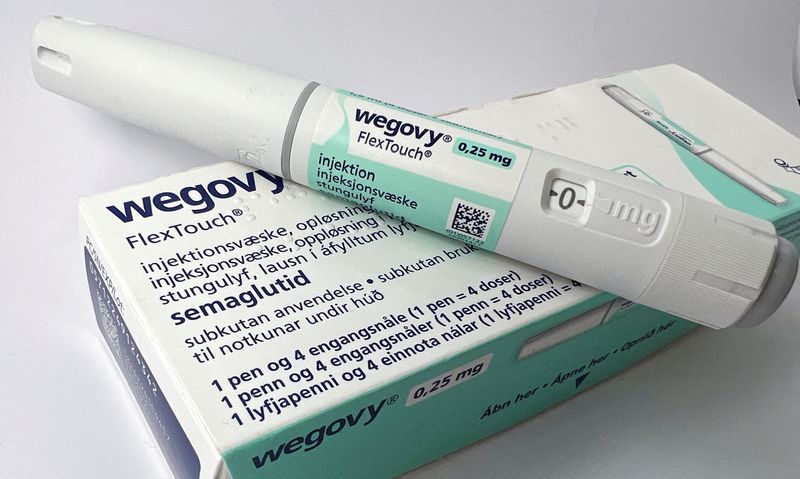(Reuters) -U.S. companies across sectors such as food and beverage makers and manufacturers of glucose monitors are facing investor questions over the risk to future sales from the growing popularity of promising weight-loss treatments.
Drugs in a class known as GLP-1 such as Novo Nordisk (NYSE:NVO)'s Wegovy and Ozempic as well as Eli Lilly (NYSE:LLY)'s Mounjaro and Zepbound have been shown to help control blood sugar and dramatically lower weight in clinical trials.
Novo Nordisk on Saturday presented data showing that the heart protective benefits of Wegovy are not solely due to weight loss.Here's what companies have said about the potential impact:
RETAILERS, FOOD AND BEVERAGE COMPANIES
Conagra might consider changing portion sizes of its snacks if the rising use of weight-loss drugs leads to a change in food consumption patterns.
Walmart (NYSE:WMT) expects revenues from its health and wellness products to increase in the second half of the year, mainly due to the popularity of weight-loss drugs.
PepsiCo (NASDAQ:PEP) Chief Financial Officer Hugh Johnston has said the company is "not seeing any impact" yet from the popularity of weight-loss drugs.
Coca-Cola (NYSE:KO) CEO James Quincey said the company was monitoring what impact, if any weight-loss drugs will have.
Hershey's CEO Michele Buck said the use of the drugs was not materially impacting the chocolate maker's business.
Keurig Dr Pepper (NASDAQ:KDP) CEO Robert Gamgort said it was not seeing any impact from the use of the drugs on coffee consumption.
DIALYSIS SERVICES PROVIDERS
Germany's Fresenius Medical Care (NYSE:FMS) said that use of Ozempic and other drugs of the same class would have an overall neutral effect on how many patients would require its kidney dialysis services in the future.
Davita is closely monitoring developments related to the drug and expects limited impact from use of the drugs, since they may only benefit some kidney disease patients.
MEDICAL DEVICE MAKERS
Johnson & Johnson (NYSE:JNJ)'s third-quarter sales for devices used in abdomen surgeries was hit by a slowdown in demand for weight-loss and other procedures, as many obese patients turned to Wegovy and Ozempic.
J&J Chief Financial Officer Joseph Wolk said use of the drugs could eventually make patients eligible for procedures like hip and knee replacements or other orthopedic surgeries.
Abbott Laboratories (NYSE:ABT), which makes glucose monitoring products, has said that the market was overestimating the impact to its sales from growing popularity of the drugs.
Abbott CEO Robert Ford (NYSE:F) has said diabetes patients could end up using glucose monitors with the weight-loss drugs in the long term. Dexcom (NASDAQ:DXCM), which also makes such monitors, said something similar in late October.
Insulet (NASDAQ:PODD) Corp expects that the use of Ozempic and Mounjaro could delay the time for patients to become dependent on insulin, but does not expect its long-term market for insulin pumps to be impacted.
Surgical robots maker Intuitive Surgical (NASDAQ:ISRG) said the U.S. growth rate for weight-loss surgery was slowing as patients consider using the new drugs instead.
However, Intuitive does not expect patients to stay on these drugs for longer than a year or two.
Boston Scientific (NYSE:BSX) expects the impact from weight loss drugs on its heart devices to be "very limited" in the short term and "minor" in the long term.
Michael Farrell, CEO of Resmed (NYSE:RMD), which makes devices to treat sleep apnea, said on an October investor call the company is "tracking many thousands of patients on GLP-1 and we're seeing maintenance of adherence. We're seeing maintenance of resupply programs and really no change".

DRUG DISTRIBUTORS
Cencora, formerly called AmerisourceBergen (NYSE:COR), Cardinal Health (NYSE:CAH) and McKesson (NYSE:MCK) have flagged potential boost to revenues this year owing to the growing demand for weight-loss drugs.